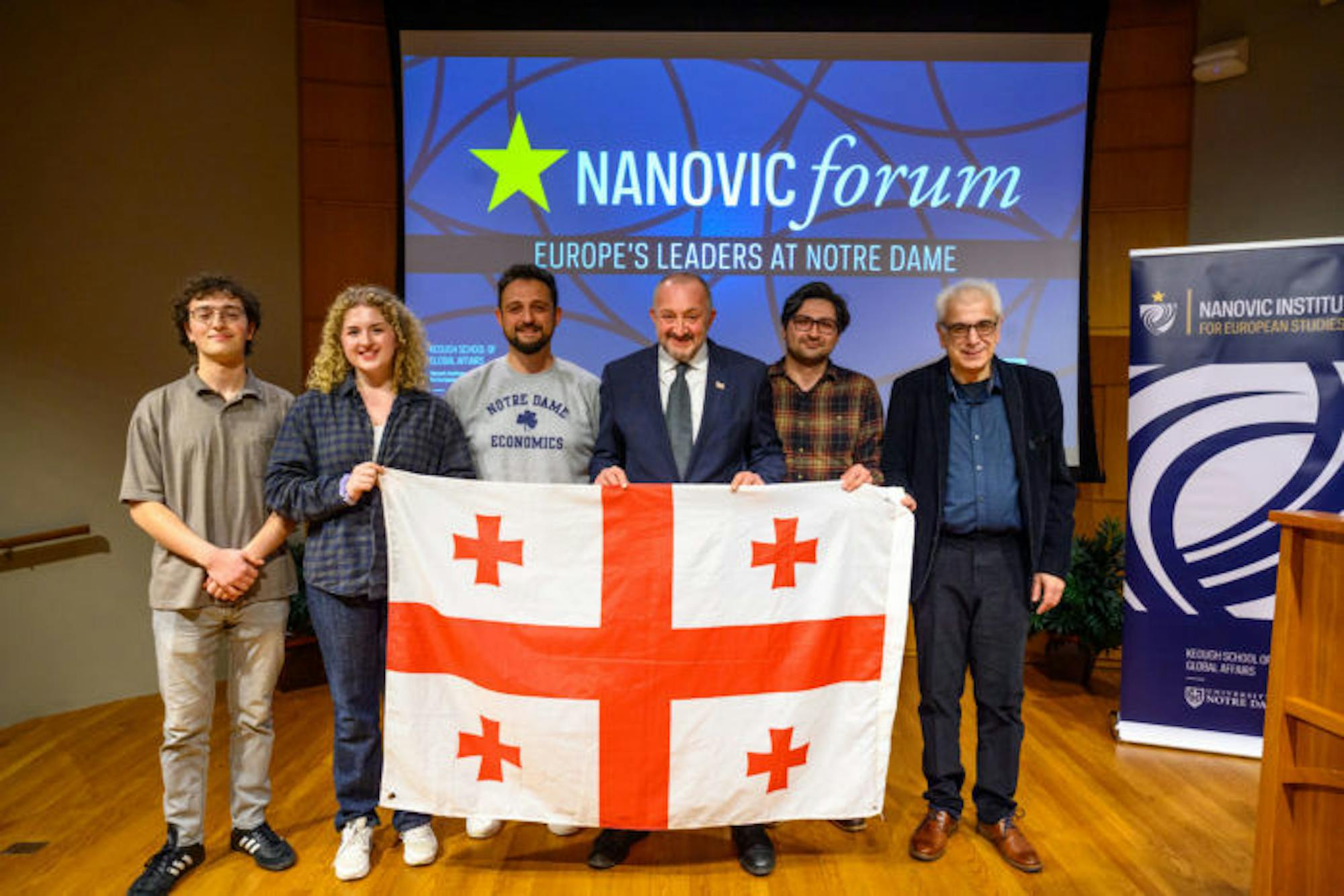On Wednesday, the Nanovic Institute for European Studieshosted Giorgi Margvelashvili, the former president of the Republic of Georgia, to deliver the annual Forum Lecture titled “Russian Aggression in Ukraine and Eastern Europe: Post-Soviet Bloc Politics and Consequences” in the Hesburgh Center Auditorium. 
Fr. Robert Dowd, vice president and associate provost for interdisciplinary initiatives at Notre Dame, introduced Margvelashvili, prefacing that “there is no introduction that will do justice to his life and accomplishments.”
Margvelashvili served as the fourth president of Georgia from Nov. 2013 to Dec. 2018. Born in Tbilisi in 1969, he attended Tbilisi State University in 1998 and earned a doctorate in philosophy. During his term, he was active in grassroots youth initiatives and supported the protection and expansion of minority and LGBTQ+ rights, Dowd said.
Margvelashvili opened the lecture with his appreciation of the peaceful, open-hearted nature of his country.
Georgia is one of the most tolerant nations and a “place of freedom for all regardless of religious, ideological or other differences,” he said.
Following these remarks, he set the scene for his discussion on post-Soviet bloc conflict by comparing the political aftermath of World War II and the aftermath of the Cold War. He describes that Japan and Germany arose from World War II as two of the most democratic countries with effective protection of human rights, while Russia emerged from the Cold War as a totalitarian regime with an aggressive nuclear arsenal.
Regarding the aftermath of the Cold War, Margvelashvili asked the audience to consider the critical question: “What went wrong?”
In his eyes, there is no clear answer. He believes one consistent barrier to decreasing Russian aggression is the unknown actions Putin would take in the event of losing power. Margvelashvili describes that in 2008, 2014 and 2022, there was little to no international response to Russian aggression. He said that Zelenskyy, the current President of Ukraine, is leading the fight to change that narrative.
“This comes from just an individual who decided that he's going to fight and die for his nation, an individual who didn't experience the kind of international support we are witnessing right now. He united his efforts for the nation,” Margvelashvili said.
Western countries and free nations are demonstrating an unprecedented amount of support against Russian aggression because of the courage of Zelenskyy, Margvelashvili said.
He stated that countries worldwide understand the severity of Russian violence in Ukraine and that Ukraine needs to win this fight — but still fear the unknown consequences of Ukraine winning.
“Everyone agrees that Ukraine has to win, but no one knows how Russia can lose because the same questions about the process have been there since the Cold War. What will happen with all the nuclear resources as soon as Ukraine wins?” Margvelashvili said.
Margvelashvili emphasized that the global political sphere faces the same conflicts right now as it did at the end of the Cold War.
“There was, and currently is, no clear vision from the United States or Western countries of how the Soviet Union or Russia should be reformed,” Margvelashvili said.
According to Margvelashivuli, there is no simple next step to take toward a more peaceful, democratic world in Eastern Europe with the influence of Putin’s totalitarian regime.
However, Margvelashivuli states he has not lost hope in the democratization of Russia, pointing to a historical example of the fight for democracy in Russia. After the dissolution of the Soviet Union in 1991, Margvelashvili recalled how a coup attempt to rebuild the Soviet Union was unsuccessful because of the efforts of Moscow citizens in protest.
“Moscow citizens felt that it was a democratic country and that they had the right to fight for their democracy,” he said.
These efforts to fight for democracy leave a glimmer of hope in Margvelashvili in the ability for power to be returned to the people. He also called on the international community to continue engaging in bold efforts to support Ukraine.
During a conversation over coffee the following day, Margvelashvili told The Observer, “In these kinds of efforts, you need international participation.”
He emphasized that participation from the international community, specifically youth participation in politics, will be critical to building a more just and peaceful world.
“I love to motivate young people to go into politics in any kind of form,” he said. “And I believe this is necessary for their own security.”













